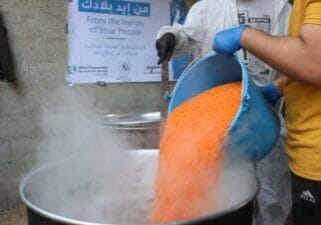News > Blog
Igniting Children’s Potential, One Bite at a Time: Reflections from the International Food Aid Showcase
Published 06/07/2024 by Global Communities
By Paula Rudnicka, Sr. Manager for Public Affairs

Last month, Global Communities participated in the 2024 International Food Aid Showcase at the United States Department of Agriculture (USDA). The showcase brought together diverse stakeholders representing all segments of the U.S. food assistance value chain—from farmers to implementing partners and government agencies. At the beginning of the event, the speakers emphasized the role of U.S. producers and suppliers who deliver essential food commodities to populations facing hunger and food insecurity around the world: from beans and lentils to rice and canned fish. The panelists also spoke about the challenges of global food aid, including rising costs, time and waste, rigid cargo regulations and low waters in key ports. One speaker emphasized the vital role of women in the global quest for agricultural sustainability and food security. She noted that the United Nations General Assembly has declared 2026 as the International Year of the Woman Farmer. This worldwide observance will not only honor women’s immense contributions to the agricultural sector, but also catalyze action to address unique barriers women farmers face.
Global Communities hosted an exhibit at the showcase, in celebration of more than 20 years of partnership with USDA. Since 2002, Global Communities has implemented 18 USDA-funded McGovern-Dole International Food for Education and Child Nutrition (McGovern-Dole) programs and three Local and Regional Procurement (LRP) projects spanning five countries. We are now serving more than one million children with daily nutritious meals in over 3,800 schools across the world.
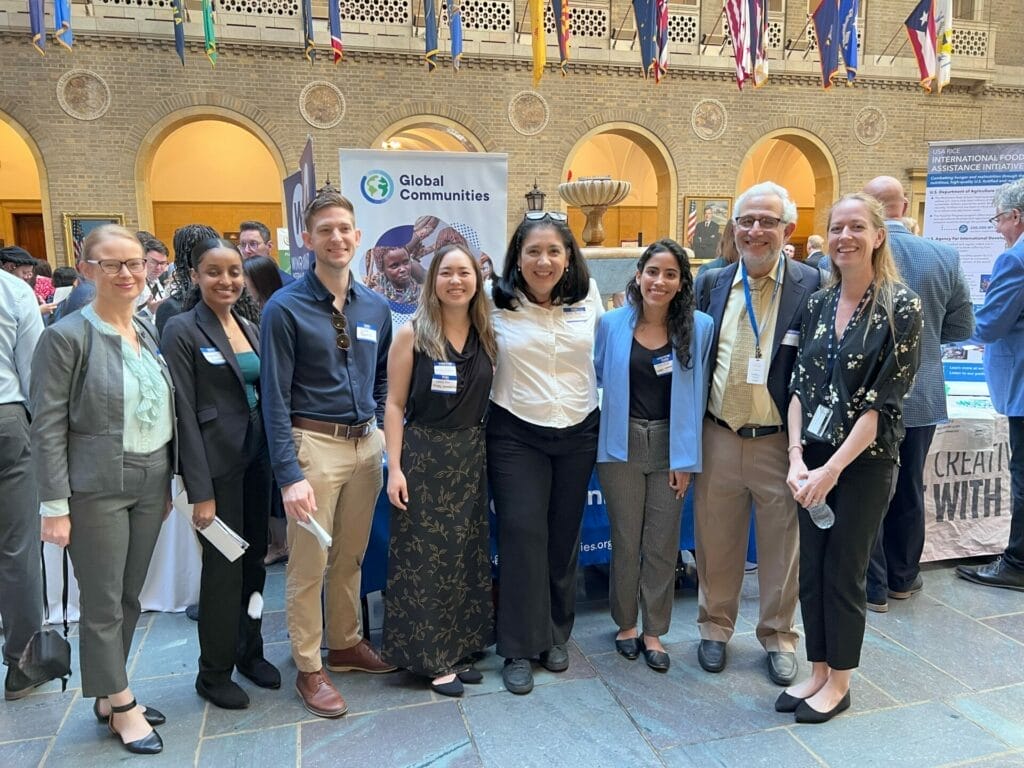

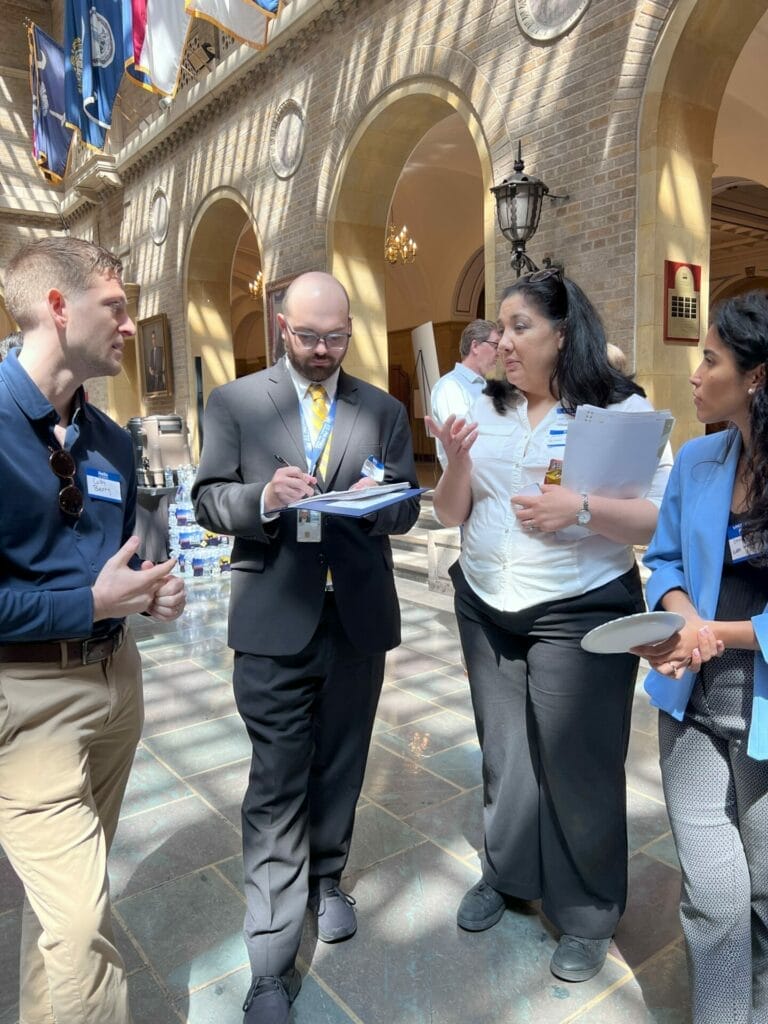
Our integrated school feeding approach is multidisciplinary, extending far beyond imported food aid. We promote literacy and early child development; invest in climate-smart and nutrition-sensitive agriculture; improve school infrastructure; and strengthen the capacity of local communities to gradually transition to locally owned school meal programs. Children’s health and well-being are always our top priority. In addition to improving children’s nutrition, our programs increase primary school attendance rates and improve students’ learning outcomes. Currently, Global Communities implements integrated school meals programs in Central America, Madagascar and Tanzania.
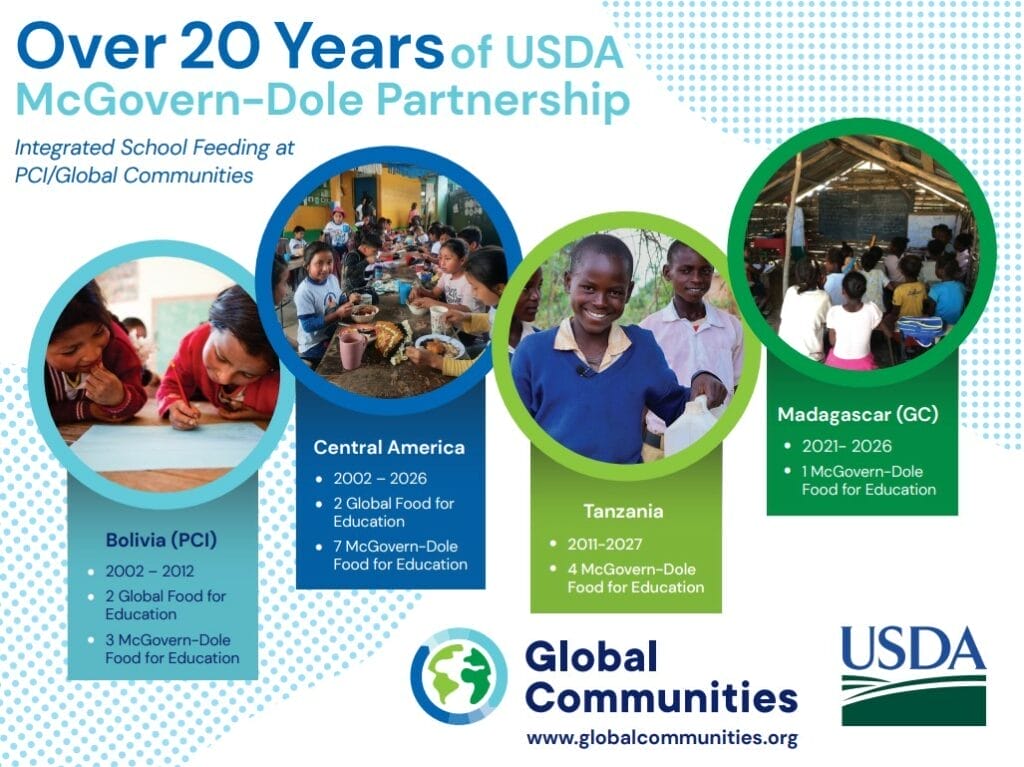
After the event, I asked my Global Communities’ colleagues who work on McGovern-Dole programs for their reflections. The following colleagues participated in the exchange: Leonel Arguello, Director of Integrated School Feeding; Chloe Pan, Associate Technical Advisor for Food Security and Gender; Christina Villarreal, Program Manager for the Americas; Colby Berry, Senior Program Officer for Africa; Daniela Lopez Echeverri, Program Officer for the Americas; and Hersona Abraham, Program Associate for Africa. The conversation was edited for length and clarity.

Paula: Thank you for representing Global Communities at the International Food Aid Showcase. What was the highlight of the event for you and how did it connect with the work you do?
 Leonel: At Global Communities, we carry out comprehensive and integrated school meals programs at the grassroots levels. We collaborate very closely with USDA and local partners, and we learn from each other’s expertise. However, we have limited opportunities to engage with U.S. food producers or companies responsible for logistics of food distribution. I had the opportunity to engage with these diverse stakeholders, which is crucial for understanding the complexity of international food assistance. I also had a pleasure of meeting with USDA staff members and discussing how the McGovern-Dole Program has become more holistic and robust over the past 20 years. I am glad that school feeding continues to be a priority for the U.S. government, and I have a lot of appreciation for USDA’s highly committed staff who support the program. While there are still gaps and challenges, we are headed in the right direction.
Leonel: At Global Communities, we carry out comprehensive and integrated school meals programs at the grassroots levels. We collaborate very closely with USDA and local partners, and we learn from each other’s expertise. However, we have limited opportunities to engage with U.S. food producers or companies responsible for logistics of food distribution. I had the opportunity to engage with these diverse stakeholders, which is crucial for understanding the complexity of international food assistance. I also had a pleasure of meeting with USDA staff members and discussing how the McGovern-Dole Program has become more holistic and robust over the past 20 years. I am glad that school feeding continues to be a priority for the U.S. government, and I have a lot of appreciation for USDA’s highly committed staff who support the program. While there are still gaps and challenges, we are headed in the right direction.
 Hersona: Indeed, as implementers we often do not hear about the logistics of importing food commodities from the U.S. Hearing from these diverse stakeholders provided a nuanced understanding of this process. I found the discussion about canned commodities as alternatives to conventional staples like rice particularly intriguing. Overall, the speakers and exhibitors offered valuable and enlightening perspectives.
Hersona: Indeed, as implementers we often do not hear about the logistics of importing food commodities from the U.S. Hearing from these diverse stakeholders provided a nuanced understanding of this process. I found the discussion about canned commodities as alternatives to conventional staples like rice particularly intriguing. Overall, the speakers and exhibitors offered valuable and enlightening perspectives.

Chloe: Several attendees I spoke with were not familiar with the holistic nature of school meals programs, and it was great to hear their positive reactions to our integrated and inclusive approach. I also appreciated the announcement of 2026 as the International Year of the Woman Farmer.
A few years ago, Global Communities made an important decision to conduct gender and inclusion analyses at the start of each of our McGovern-Dole program to ensure that we were, at a minimum, taking gender-responsive and inclusive approaches to our activities. Mothers are actively participating in parent-teacher associations, volunteering as cooks in school kitchens, working in school gardens, and participating in savings groups supported by our programs. Yet they are still expected to manage household responsibilities and engage in income-generating activities. Recognizing these pressures, our recent projects have included activities that engage men, promote positive masculinities and involve couples in dialogues around gender equality, division of household responsibilities, joint decision-making, and involvement in children’s health and education. It has been very inspiring to see both mothers and fathers actively participating in our school feeding programs, challenging harmful gender norms, and modeling a bright future for their children.
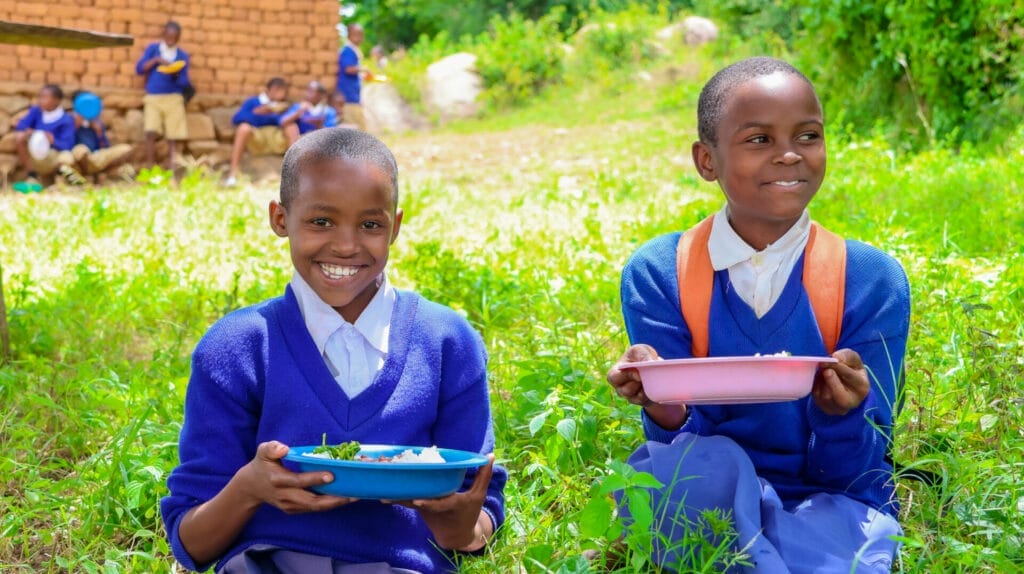

Paula: Great observations! On your last point, Chloe, it is important to add that Global Communities’ Strategic Vision prioritizes gender integration across all programs. It also includes a commitment to develop and test an innovative approach to addressing the intersection of gender, food security and climate change. I know that investing in women farmers will be a crucial component of this approach. What are the promising trends and challenges in the food aid sector? What worries you and what sparks your hope?
 Leonel: Delivering international food assistance is very complex. Many expected and unexpected challenges can arise in procuring, transporting and delivering food commodities to our communities. What sets our programs apart is a focus on sustainability. We work very closely with governments, local producers and community leaders to incorporate locally grown foods, diversify children’s diets and ultimately transition communities to locally owned school meal programs. High community participation, including from teachers and parents, always sparks my hope. In fact, the involvement of mothers – and increasingly fathers – is key to the success of our programs. As the world is changing fast, school feeding programs need to be flexible and adaptable to new circumstances. Global Communities is prepared to take on this challenge.
Leonel: Delivering international food assistance is very complex. Many expected and unexpected challenges can arise in procuring, transporting and delivering food commodities to our communities. What sets our programs apart is a focus on sustainability. We work very closely with governments, local producers and community leaders to incorporate locally grown foods, diversify children’s diets and ultimately transition communities to locally owned school meal programs. High community participation, including from teachers and parents, always sparks my hope. In fact, the involvement of mothers – and increasingly fathers – is key to the success of our programs. As the world is changing fast, school feeding programs need to be flexible and adaptable to new circumstances. Global Communities is prepared to take on this challenge.
 Colby: One of the biggest challenges is importing USDA-donated food commodities to the countries where our programs operate. Based on our experience in Tanzania, for example, it is harder and harder to get the food delivered from the regulatory standpoint. In addition, there are many stigmas and misconceptions toward these commodities among community members we serve. It is always very important to clearly communicate to our communities that the food complies with international and local standards. It is also crucial to obtain the respective government’s sign off on the quality and fortification of the food.
Colby: One of the biggest challenges is importing USDA-donated food commodities to the countries where our programs operate. Based on our experience in Tanzania, for example, it is harder and harder to get the food delivered from the regulatory standpoint. In addition, there are many stigmas and misconceptions toward these commodities among community members we serve. It is always very important to clearly communicate to our communities that the food complies with international and local standards. It is also crucial to obtain the respective government’s sign off on the quality and fortification of the food.

Chloe: I completely agree with Colby. Each country has different standards and priorities, and we work very closely with different ministries to ensure compliance. Thankfully, over the years, Global Communities has built strong relationships with governments and local stakeholders, so that we can navigate these challenges together and focus on delivering high quality food to the communities that need it the most.

Christina: Yes, international food assistance can be quite political in the countries where we operate. In Guatemala, we have been implementing McGovern-Dole programs for over 12 years. A timespan this long naturally includes elections and changes in administrations. This requires a continuous effort to create and strengthen relationships at all levels of the government to implement the overall mission of USDA’s McGovern-Dole programs: food for education and child nutrition. Collaboration with the respective governments is vital to the success of school feeding programs. So is active participation of educational institutions, including school administrators and teachers. Cultivating strong partnerships with local stakeholders contributes to the sustainability and longevity of school meal interventions after we have exited a community. On the flip side, we may face delays if the community buy-in and support are not obtained early on.

Daniela: I second what Christina has said. Collaborating with local partners for sustainable progress is essential. While importing food aid helps address the immediate needs of populations experiencing hunger, the involvement of local governments, farmers, schools and community leaders is important to achieving food security in the long run.
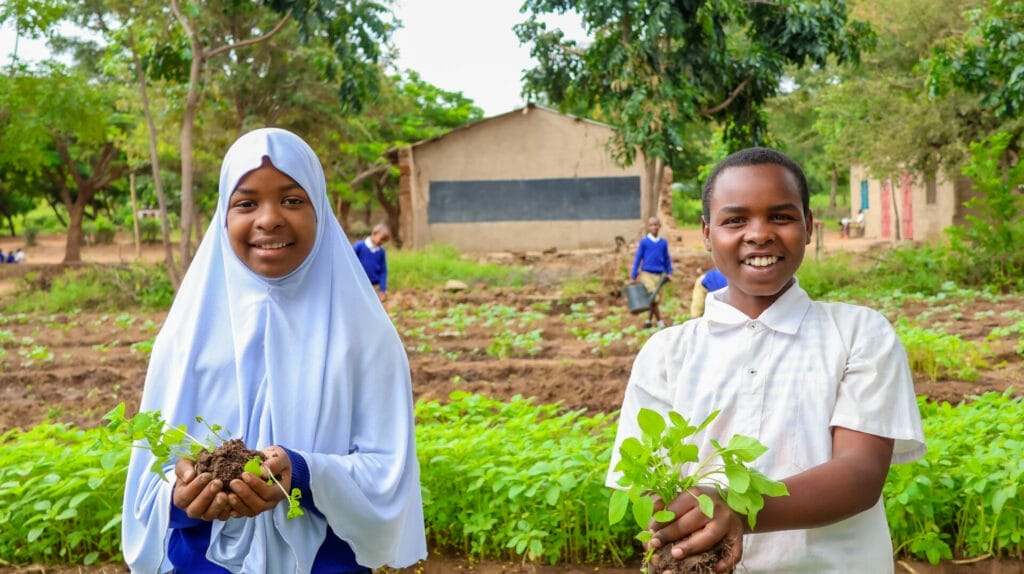

Paula: What can Global Communities – and our sector as a whole – do better to serve populations around the world who face hunger and food insecurity?

Daniela: We need to get better at ensuring that our programs are truly inclusive and tailored to the needs of each community. For example, the materials we use to promote better health behaviors should be always translated to local languages. We also must do everything in our power to serve the most vulnerable and hard-to-reach populations.

Leonel: We also need to keep educating policy- and decision-makers, including the U.S. Congress, about the importance of holistic approaches to food aid. Strengthening the resilience of local food systems is absolutely critical to creating a world free of hunger. We also need to keep advocating for more long-term funding to achieve these goals.

Paula: Thank you for your thoughts and perspectives!
To learn more, please read our recent blog, School Feeding Interventions as a Tool for Addressing Child Malnutrition: Experiences from Tanzania, Guatemala and Madagascar.





